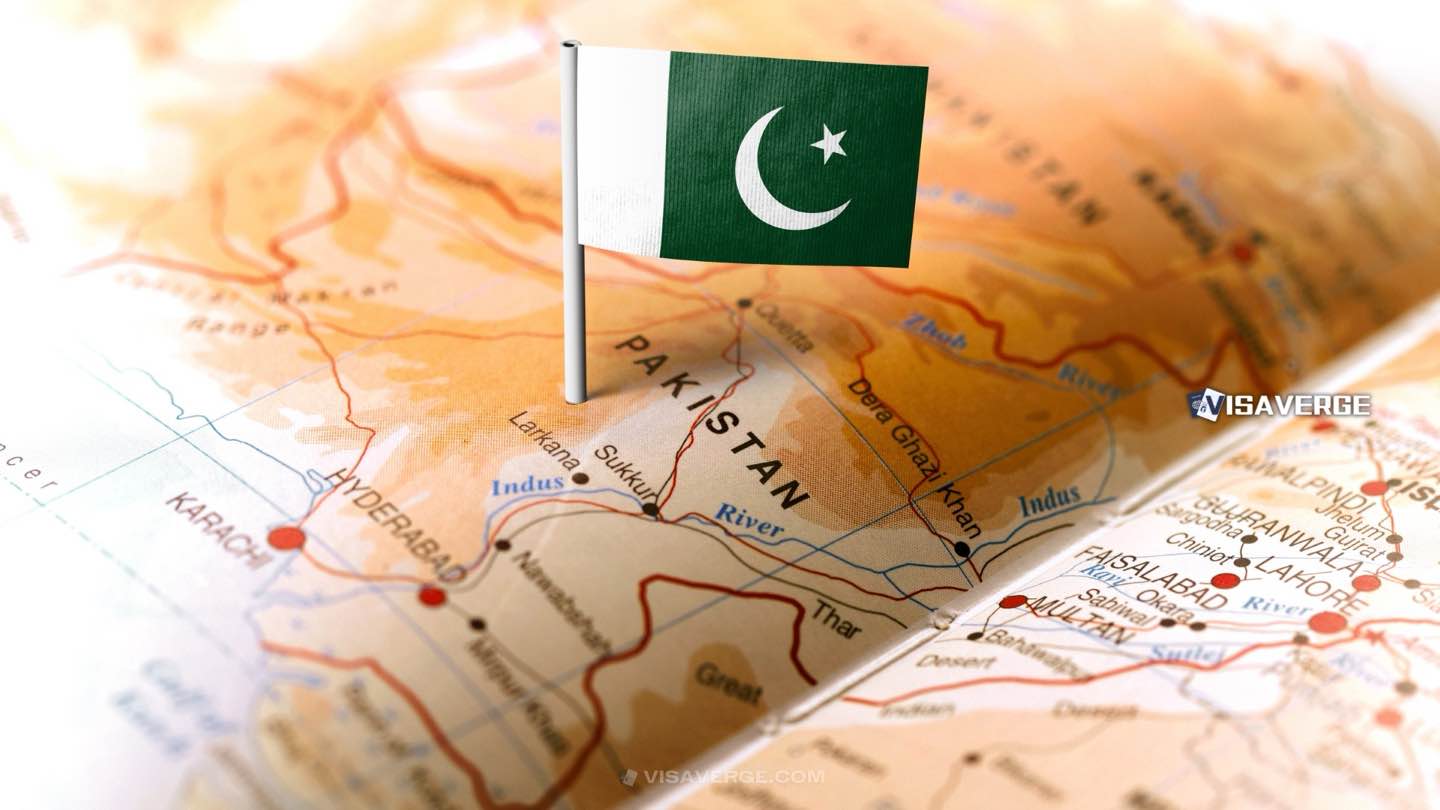Pakistan’s policy toward Afghan nationals has reached a critical point in July 2025, with mass arrests, deportations, and the end of key legal protections. Over the last week of June, authorities detained more than 2,100 Afghans, mostly in Balochistan province, as part of a sweeping campaign that has already forced nearly one million people to leave since late 2023. The government’s decision to stop extending visas and let the Proof of Registration (PoR) card expire has left over a million Afghans without legal status, putting them at immediate risk of arrest and deportation.
Sharp Increase in Arrests and Deportations

Between June 22 and 28, 2025, Pakistani police arrested 2,144 Afghan nationals—a 41% jump from the previous week. Most of those detained either held Afghan Citizen Cards (ACCs) or had no documents at all. Balochistan province, especially the districts of Chaghi, Attock, and Chaman, saw the highest number of arrests. According to the International Organization for Migration (IOM), nearly 60,000 Afghan refugees were deported in April 2025 alone. Since the start of the deportation campaign in late 2023, Pakistan has repatriated 979,486 Afghan nationals, with more than one million returning between September 2023 and June 2025, based on UNHCR data.
End of Legal Status: PoR and ACCs No Longer Valid
The PoR card, which once protected registered Afghan refugees from deportation, expired on June 30, 2025. This change affects about 1.3 to 1.4 million Afghans who previously had some form of legal status. As of July 2025, only those with a valid passport and Pakistani visa are allowed to stay. ACCs are no longer accepted, and PoR cards are now invalid. The government has made it clear that any Afghan national without a valid travel document and Pakistani visa faces deportation, even if they hold visas from other countries like Australia.
Visa Policy Changes and Limited Exceptions
Pakistan has stopped extending visas for Afghan nationals, except for a small group of transporters. On June 20, 2025, the government announced a special visa for Afghan drivers and transporters to keep cross-border trade moving under the Afghanistan-Pakistan Transit Trade Agreement (APTTA). This visa allows multiple entries for one year, costs $100, and requires several documents, including a passport, Afghan ID, employment letter, and a valid driving license.
Potential Extension of Departure Deadline
Officials are considering giving Afghan nationals more time to leave by extending the June 30, 2025, deadline. This would help families settle their affairs and depart in an orderly way. However, as of July 22, 2025, no official extension has been announced. Many Afghans remain in limbo, unsure if they will have more time or face immediate removal.
How Afghan Nationals Are Affected: Step-by-Step Guidance
For Afghan nationals in Pakistan, the situation is urgent and confusing. Here’s what you need to know:
- Check Your Documents: Only a valid Pakistani visa and passport allow you to stay. PoR cards and ACCs are no longer accepted.
- Assess Your Risk: If you are undocumented or your PoR/ACC has expired, you are at high risk of arrest and deportation.
- Voluntary Return: The government encourages voluntary departure before forced removals increase. The previous deadline was June 30, 2025, but an extension may be possible.
- Transporters’ Exception: Afghan drivers and transporters can apply for a special one-year, multiple-entry visa by submitting the required documents online.
- Seek Legal Help: If you have a pending case or special circumstances (such as a foreign visa), consult an immigration lawyer or your embassy. Pakistani authorities do not recognize foreign visas as a reason to stay.
- Stay Informed: Monitor updates from the Pakistani Interior Ministry, UNHCR, and trusted news sources for changes in policy or deadlines.
Official Requirements for Afghan Transporters
Afghan drivers and transporters who want to keep working in Pakistan must apply for the new visa. The application process requires:
- A recent photograph
- A copy of your passport
- Afghan national ID
- Temporary admission document
- Employment letter from a registered transport company
- Valid driving license
The visa costs $100 and is valid for one year with multiple entries. This exception is meant to keep trade flowing between the two countries, even as most other Afghan nationals face removal.
International and Local Reactions
The crackdown has drawn strong criticism from international organizations. Amnesty International and UNHCR have both said the policy lacks clear rules and puts even documented refugees at risk. Reports from these groups also mention abusive practices by police, such as bribery, property confiscation, and arbitrary detention.
Pakistani officials defend the policy, saying it is needed for national security and to manage the country’s resources. They point to concerns about militant groups and the strain on local services. However, refugee advocates argue that Afghan nationals have contributed to Pakistan’s society and economy for decades, and that the sudden loss of legal status is unfair and dangerous.
Humanitarian and Economic Impact
The end of legal protections has left Afghan nationals in a vulnerable position. Many have lived in Pakistan for years, building businesses, raising families, and becoming part of their communities. Now, they face the threat of arrest, detention, and forced return to Afghanistan, where conditions remain unstable under Taliban rule.
International organizations warn of a growing humanitarian crisis. Many returnees struggle to find shelter, work, or basic services in Afghanistan. The crackdown also disrupts local economies, especially in border areas where Afghan labor and trade are important.
Historical Background: Decades of Displacement
Afghan refugees have lived in Pakistan since the Soviet invasion of Afghanistan in 1979. Over the years, new waves of arrivals have come due to ongoing conflict and instability. Pakistan has hosted one of the world’s largest refugee populations, with about 1.5 million Afghans present as of 2024. Legal protections like the PoR card (introduced in 2006) and ACCs were always temporary and subject to change. The current crackdown, which began in November 2023, is the most aggressive effort yet to reduce the Afghan refugee population.
Policy Details and Recent Changes
- PoR Card Expiry: The PoR card expired on June 30, 2025, ending legal status for over a million Afghans.
- No-Objection Certificate (NOC): Since January 2025, Afghan refugees cannot live in Islamabad without an NOC, which is very hard to get.
- Arrest Trends: Arrests peaked in April 2025 but have dropped by 81% since then. Still, weekly numbers remain high.
- International Criticism: Groups like Amnesty International and UNHCR say the policy is unclear and unfair, especially for vulnerable people.
- Abusive Practices: Reports mention police demanding bribes, taking property, and detaining people without reason.
What Afghan Nationals Should Do Now
If you are an Afghan national in Pakistan, take these steps:
- Check your documents: Make sure you have a valid Pakistani visa and passport. If not, you are at risk.
- Consider voluntary return: Leaving before forced removal may help you avoid detention and property loss.
- Apply for a transporter visa if eligible: If you work as a driver or transporter, gather the required documents and apply online.
- Seek legal advice: If you have special circumstances, talk to a lawyer or your embassy.
- Stay updated: Follow official announcements from the Pakistani Interior Ministry and international organizations.
Frequently Asked Questions
- What if my PoR card has expired? You no longer have legal status and are at risk of arrest and deportation.
- Can I get a new visa or extension? Only transporters can apply for a new visa. General extensions are not available.
- What if I have a foreign visa or residency? Pakistani authorities do not accept foreign visas as a reason to stay. You must have a valid Pakistani visa.
- Is there hope for an extension? A Cabinet decision is pending, but no extension has been announced as of July 22, 2025.
- Where can I get help? Contact UNHCR, IOM, or your embassy for advice and support.
Official Resources
For the latest information and official updates, visit the Pakistani Ministry of Interior website. You can also check the UNHCR Pakistan page for refugee support and the IOM Pakistan site for data on deportations and detentions.
Implications for Communities and Stakeholders
The crackdown affects many groups:
- Afghan nationals: Face loss of homes, jobs, and community ties, with uncertain futures in Afghanistan.
- Pakistani communities: May lose workers and neighbors, especially in border areas where Afghans play a key role in trade and daily life.
- Business sector: Transport and trade industries rely on Afghan drivers and workers, leading to the special visa exception for transporters.
- International organizations: Continue to push for fair treatment and protection for refugees, warning of a humanitarian crisis if mass deportations continue.
Expert Perspectives
Pakistani officials say the policy is needed for security and resource management. International agencies argue that it puts vulnerable people at risk and lacks clear rules. Refugee advocates highlight the positive role Afghan nationals have played in Pakistan and call for a more humane approach. The business community, especially in border regions, supports the exception for transporters to keep trade moving.
As reported by VisaVerge.com, the situation remains tense and uncertain, with many Afghan nationals waiting for news about a possible extension or new legal options.
Looking Ahead: What’s Next?
- Possible Extension: The government may extend the deadline for departure, but nothing is confirmed yet.
- Continued Enforcement: If there is no extension, arrests and deportations will likely increase, especially in cities and border areas.
- International Pressure: Human rights groups and foreign governments may push Pakistan to reconsider, but security concerns remain strong.
- No New Legal Framework: There is no sign of a new system to replace the PoR card, leaving most Afghan nationals in legal limbo.
- Selective Exceptions: The special visa for transporters shows that economic needs may lead to some exceptions, but most refugees will not benefit.
Conclusion and Practical Steps
Pakistan’s new approach to Afghan nationals marks a turning point, ending decades of temporary protection and forcing over a million people into uncertainty. The government’s focus on security and resource management has led to mass arrests and deportations, with only a narrow exception for transporters. International organizations warn of a humanitarian crisis, and many Afghans face difficult choices about their future.
If you are affected, check your documents, consider voluntary return, seek legal advice if needed, and stay informed through official channels. For more information and updates, visit the Pakistani Ministry of Interior.
By staying alert and taking practical steps, Afghan nationals can better protect themselves and their families during this challenging time.
Learn Today
PoR Card → Proof of Registration card that granted legal protection to registered Afghan refugees in Pakistan.
Afghan Citizen Card (ACC) → Identity document issued to some Afghan refugees, now invalid for legal stay in Pakistan.
APTTA → Afghanistan-Pakistan Transit Trade Agreement facilitating trade via special visas for Afghan transporters.
Deportation → Official removal of individuals from Pakistan due to lack of valid legal status or documents.
Voluntary Return → Process where Afghan nationals leave Pakistan willingly before forced deportation increases.
This Article in a Nutshell
Pakistan’s halt of PoR card validity in July 2025 exposes over a million Afghans to arrest and deportation, sparking a humanitarian crisis amid conflicting international and local responses.
— By VisaVerge.com













